来源:
- 清北托福慕课
- 万炜《笔尖上的托福》
- 范亚飞 王志庆 《托福写作白皮书》
- 刘文勇 《文勇的新托福写作手稿》
题型安排

Indenpendant Writing
独立写作标准主体段:段首主旨句+解释过渡句+细节例证句+段尾总结句
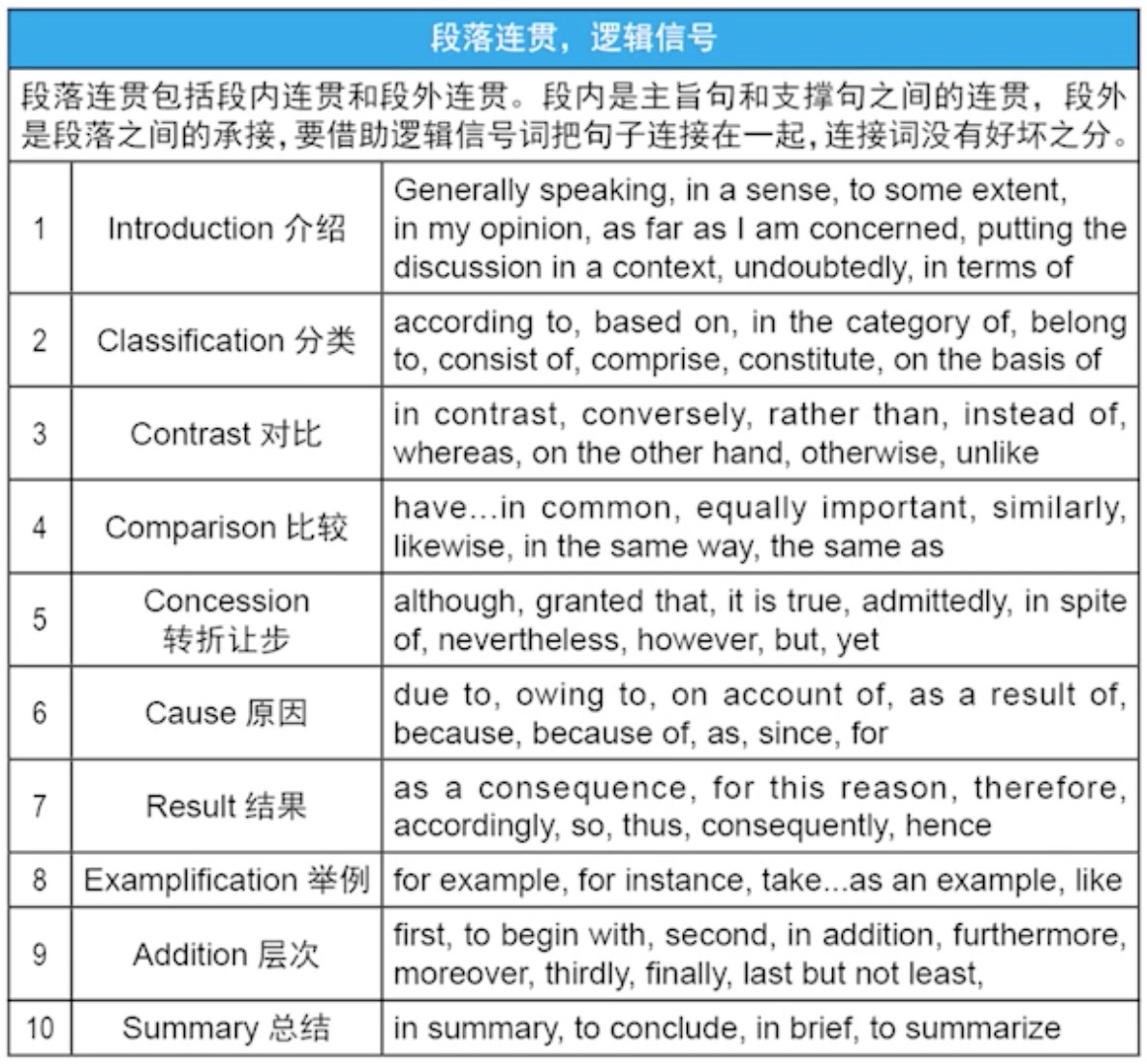

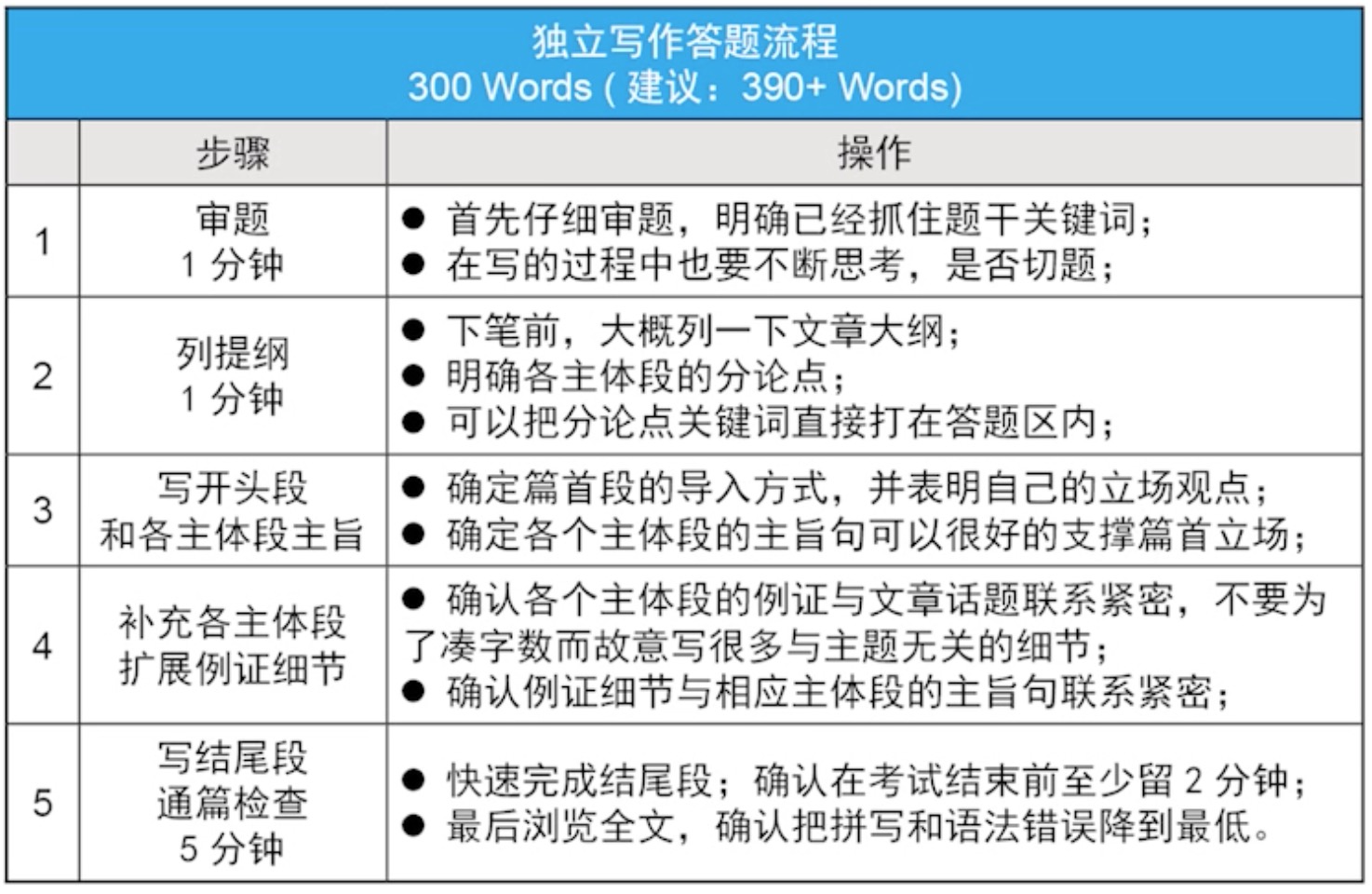
使用被动语态的3种情况:
- 动作执行者未知或故意隐瞒
- 行为或受动对象比施动对象更重要
- 进行客观陈述的时候
白皮书
可以把双方的利弊都列在草稿纸上
解题思路:
- 原因分析
- 利弊权衡
- 拆分举例
话题展开:
- 经济效益
- 社会因素(社会价值、社会影响)
- 团体因素(团体利益)
- 个人因素(个人利益、个人喜好)
- 未来发展
- 可操作性
扩展方式:
- 原因:主题句/分论点为什么能成立
- 推论:主题句/分论点会带来什么样的影响/后果
- 解释:主题句/分论点具体指什么
- 对比:不按主题句/分论点的想法会怎么样
论证方法:
- 举例论证
- 比喻论证
- 对比论证(类比、对比-横向不同事物对比,纵向同一事物不同阶段对比)
- 正反对比论证(不这么做会怎么样)
- 事实论证(统计、数据)
- 演绎推理、归纳总结
- 引用论证/名人名言(不推荐)
让步段:
- 让步句:部分接受对方观点,有明确让步方向,降低让步内容的确定性
- 让步论证:给让步句提供一个简单的合理性证明
- 转折句:对让步内容提出否定,强化己方观点
- 说明己方问题可解
- 说明双方优势共享
- 进行双方劣势对比,强调己方观点比对方观点优点多或缺点少
- 进行行为后果权衡,对方行为引发不良后果
- 转折论证:支持和加强转折句的观点,解释、推论或说明原因
写作手稿
MECE原则:Mutually Exclusive and Collectively Exhaustive 不重不漏
ME:独立不重叠。选择的信息在同一层面,它们之间互不包含。
CE:穷尽不遗漏。某个层面所包含的方方面面都讨论完,力求全面完整。
MECE条件下的“同层信息”组织
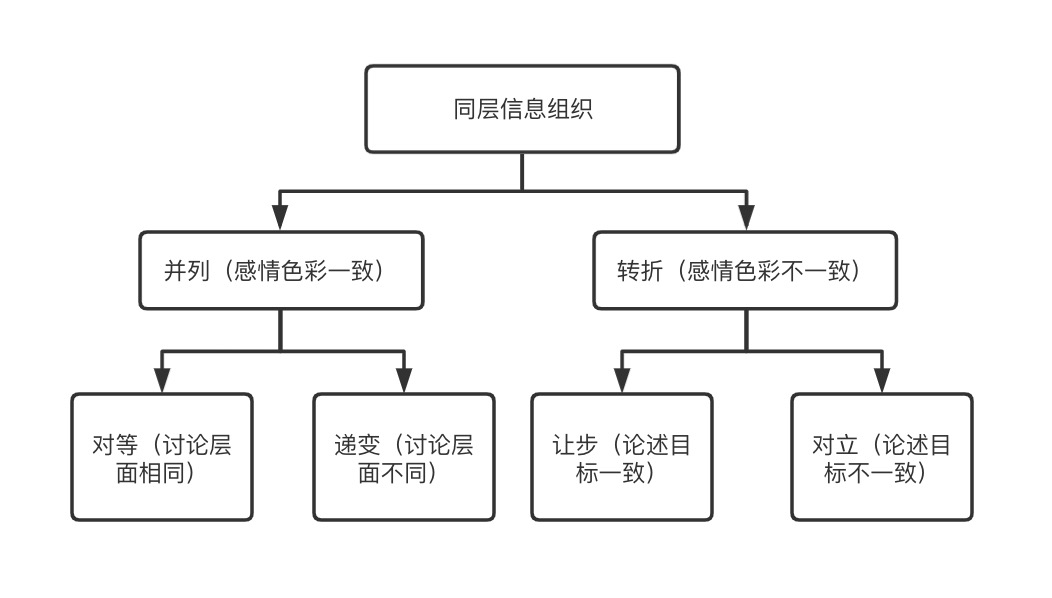
递变的种类:
- 小↔大
- 个人↔集体
- 微观↔宏观
- 特例↔普遍
- 浅↔深
- 轻微↔严重
- 次要↔重要
- 现象↔本质
- 物质/身体↔精神
- 按时间轴顺序
- 过去↔现在
- 现在↔将来
- 已知↔未知
- 短期↔长期
- 简单↔复杂
- 单一↔综合
任一分论点+递变+让步
MECE条件下的“异层信息”组织
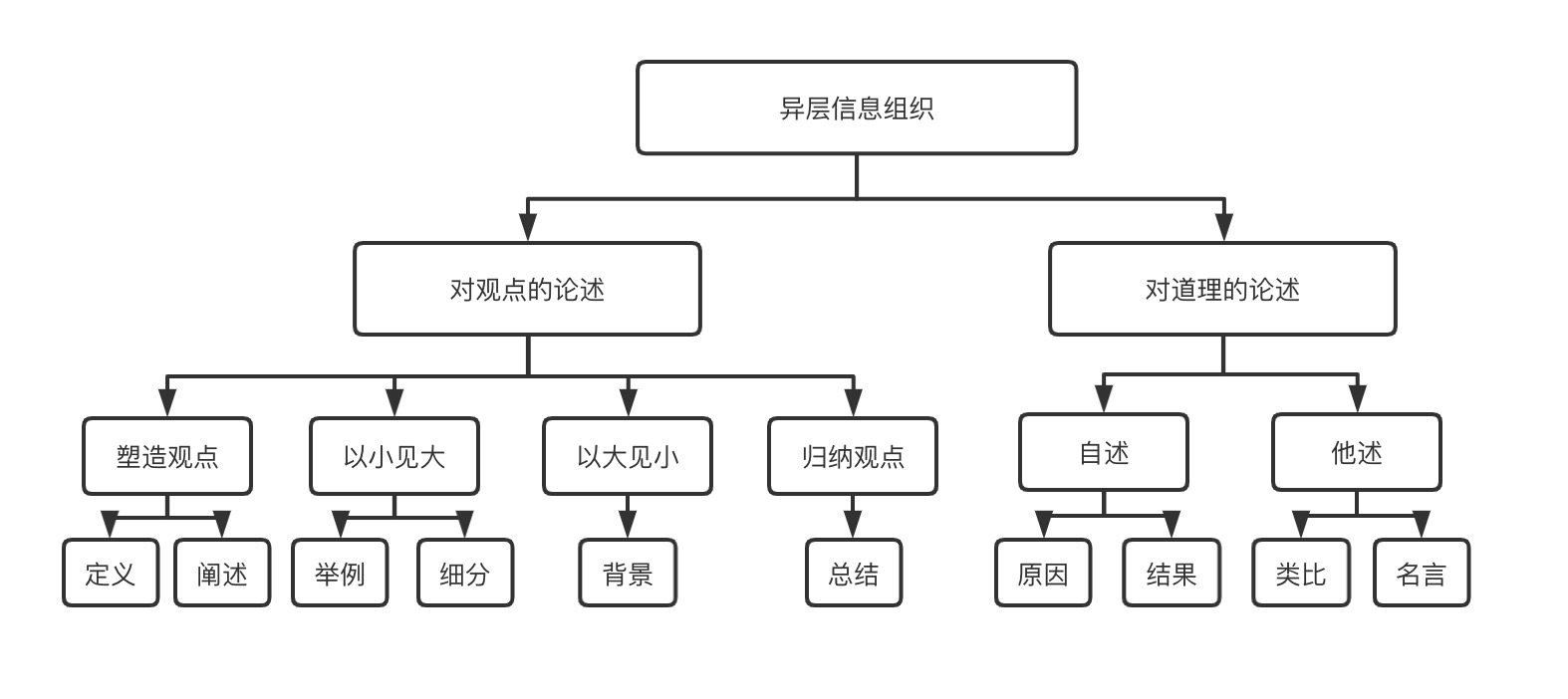
文章切入方式
1. 建议型切入
采取建议的原因和结果;
不采取建议的原因和结果;
建议的可行性;
呼吁建议的实施
2. 极端词型切入
故意构造极端词来帮助文章展开
3. 比较型切入
A的优缺点,B的优缺点组合
4. 因果关系陈述型切入
找出因果关系,然后:
路径一:A is not necessarily the reason of B.
路径二:B is not necessarily the result of A.
笔尖上的托福
独立写作分类:
- 现象描述类(行为是否发生、是否存在)
- 价值判断类(对其价值利弊进行判断,是否应该做、值得做,分析利弊)
现象描述型
列举出证据,为选择的现象找理由去解释其存在的原因,并举例。
尝试寻找造成该现象发生或不发生的理由。思考话题中的相关参与对象,思考该对象具有什么样的特点,导致了该现象发生或不发生。
价值判断型
针对建议的否定:不可行、无效、目标无意义、副作用、替代方案
思考的内容:
- 该行为可行吗,是否可以反驳?
- 该行为会带来什么后果,是否可以反驳?
- 该结果是好事还是坏事,是否可以反驳?
- 要实现该结果,是否有别的方案,是否可以反驳?
写作时可以反驳别人对自己立场的攻击。
特殊题型
涉及因果的题:
支持观点,可以把话题自带的理由当做一个附送的理由,自己补充其他理由。
反对观点,可以把话题的理由当做对立观点的理由去反驳。
三选一的题:
让步反驳,有两个靶子可以反驳。先支持自己的理由,再将两个对手逐一打倒。
没理由时怎么办
- 诉诸自身(不推荐)
- 分情况展开
- 直接举例
- 平衡展开(话题争论双方不互斥的情况下)
如何展开
两个基本原则:
- 让别人看不懂的东西需进一步改写、具体化(将抽象化为具体:例子、细节)
- 让别人不相信的东西需进一步证明、解释(要有可信度、说服力)
建议:一、将重要的描述性语言用事实性语言替换;二、存在逻辑空白的因果关系时,一定要有合理的桥梁联系。
- 诉诸自身:具象化思维
- 因果:将因到果的步骤展开,使每一步都具有合理性
- 对比:拿参照物和主要谈论的对象进行比较,以突显讨论对象的特点
- 列举:并列多个例子或情况
- 让步:段内让步,思考对方会怎样反驳,使论证更严谨
Today, a prevalent statement we often hear is that ……, because……. A considerable number of opponents, however, argue that……, since……. As far as I am concerned, the former/latter view seems align more with my perspective. Two reasons would suffice here to support my point of view.
To begin with, although…(对立面的好处), …(不否定论点的好处), that is because…(本段论点). Specifically, …(结合生活具体论述). For instance, …(举出一个例子). In contrast, if …(采取了对立面), …(导致的结果)To illustrate, …(再举举反面例子). Thus, …(再次强调本段论点).
Admittedly, a minority of individuals tend to believe that…. It is because….However, if we could analyze this issue from the different perspective, we could find those people have oversimplified the real situation that …. Therefore,….
In summary, we may safely draw the conclusion that…./ I want to reiterate that…. Overall, ….
In contemporary society, much ink has been spilled about……(题目改写),and some claim that… Such assertion, however, is torn to pieces by others. As far as I am concerned, the statement that…(题目改写)is arbitrary and one-sided because it fails to take all the related circumstances into consideration. We should analyze this statement comprehensively before we draw the eventual conclusion.
In brief, based on the previous discussion, the issue…(改写题目)is complex and needs a case by case analysis. We are not supposed to disregard those situations where the statement is unjustifiable. As a result, I cannot totally agree with this statement.
Intergrated Writing
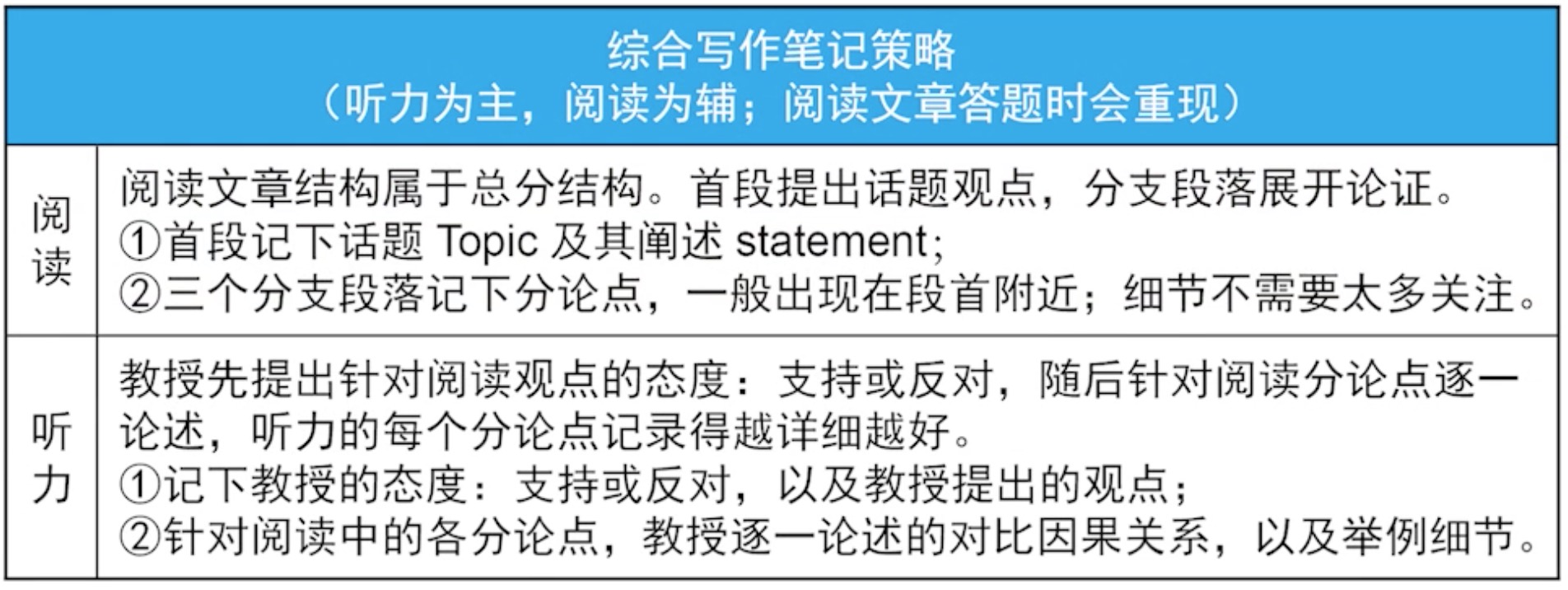
综合写作阅读抓分论点主旨句
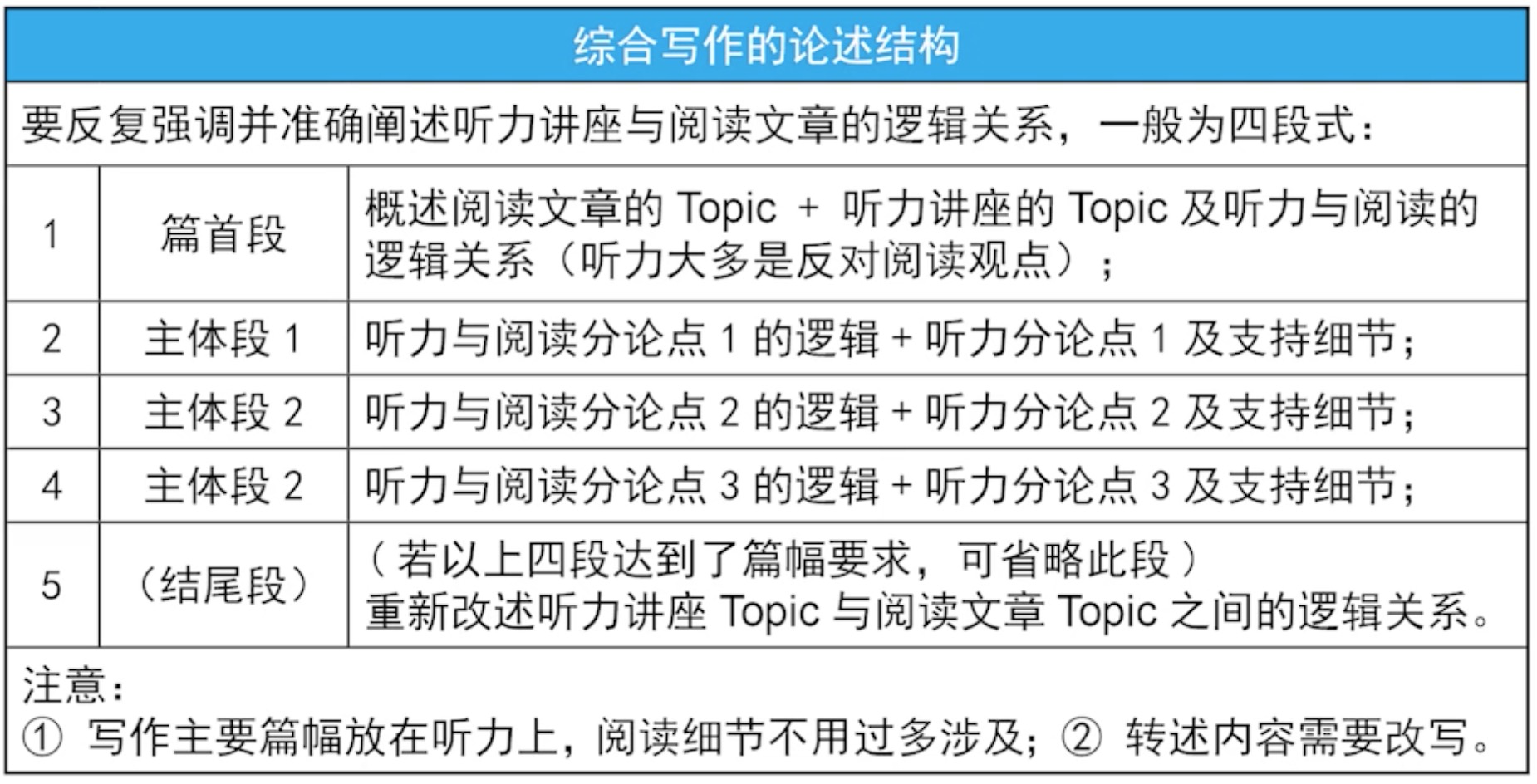
写作的时候阅读内容必须改写
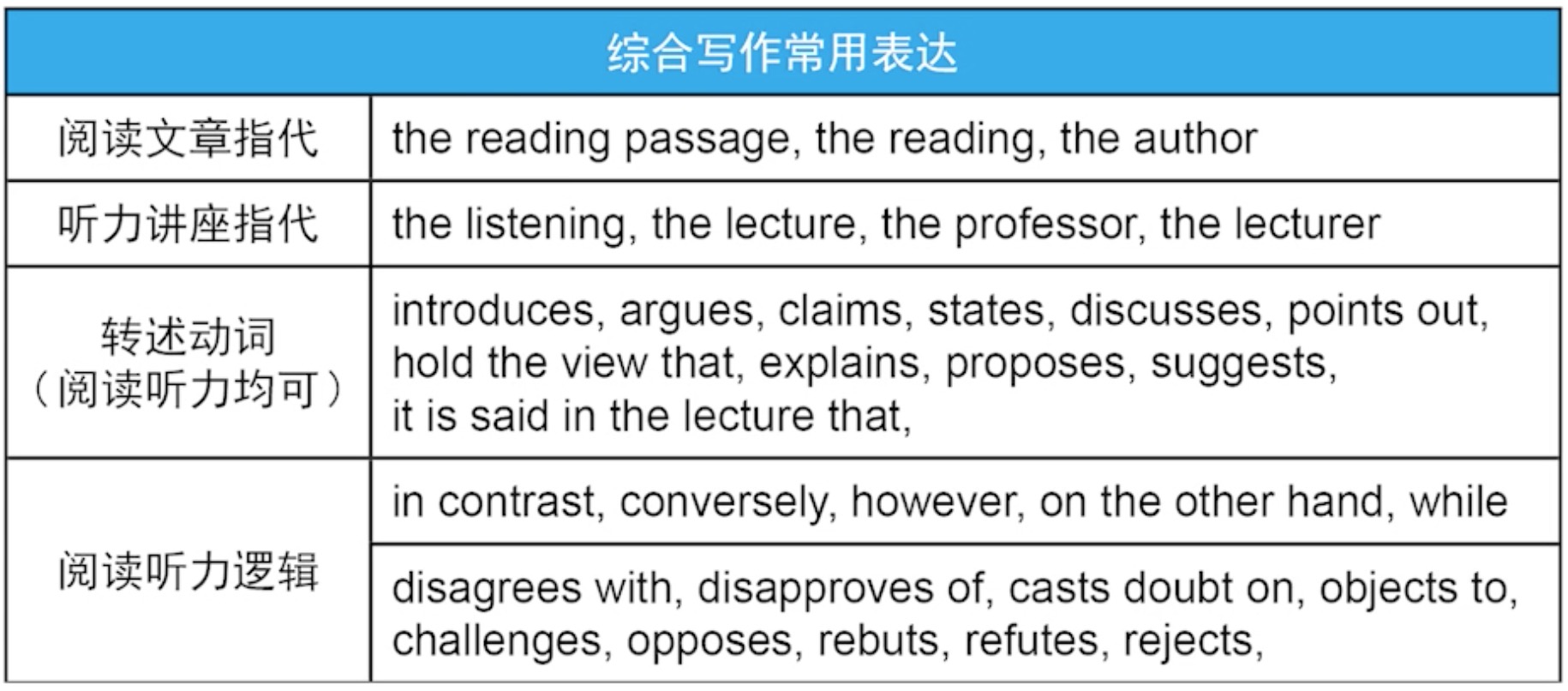
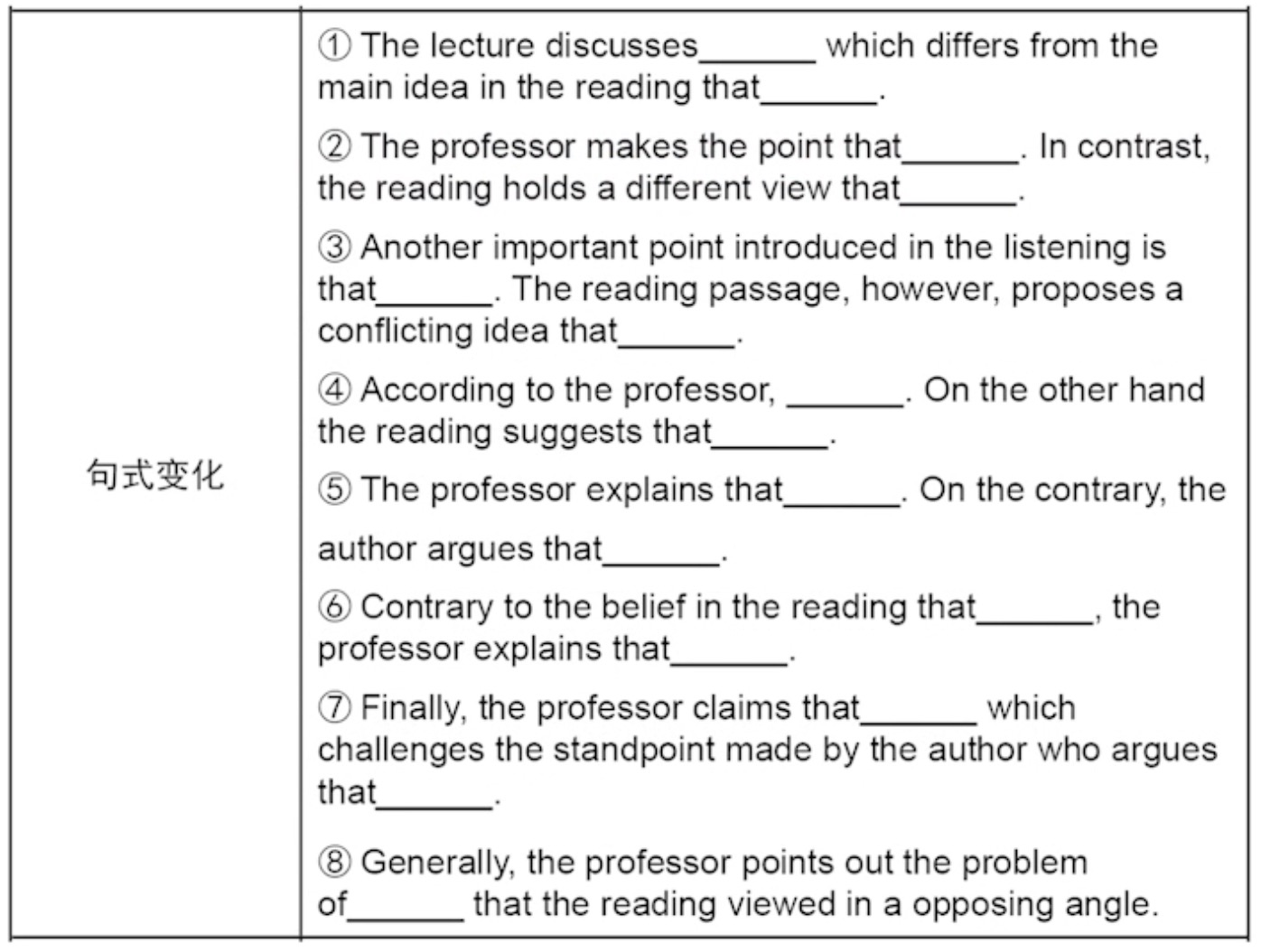
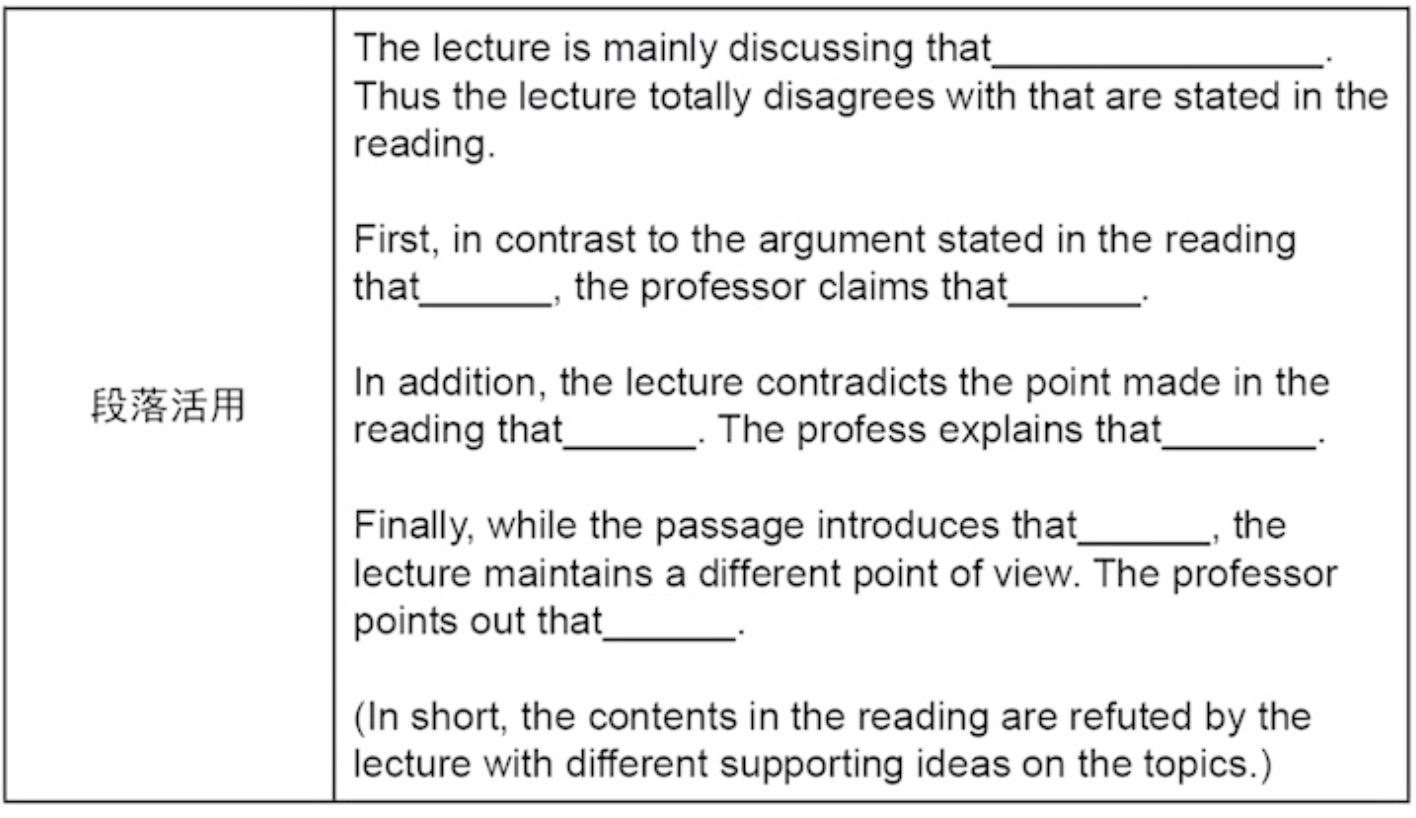
有时间的话把reading的观点和理由提一下
听力部分对一个建议进行否定,有三种可能策略:
- 方案不可行,因为某些原因导致根本做不到;
- 方案无效,即并不能解决相应的问题;
- 方案虽可行且有效,但危害严重,副作用大过其正作用。
分类:
- 观点理由型文章:抛出一个观点,几个理由支持这个观点。听力否定该观点并削弱理由对该观点的支持。
- 现象解释型文章:抛出一个现象/已知事实,事实本身不能反驳,几个解释解释造成这个现象的原因。听力说三个解释无法解释现象的发生。
- 因果解决型文章:抛出一个困难,提出几个方案。听力指出方案各自的缺陷。
观点理由型
view, claim, position; reasons/arguments/evidences
观点C(Conclusion),理由P(Premise)
针对每一个P,听力只有两种反驳策略:
- P是错的
- P不支持C,即就算P是对的,C也是错的,也即否定PC之间的逻辑关系
开头段:
The reading proposes three arguments to support that C, all of which are questioned in the lecture.
反驳P本身:
- Contrary to the reading, the lecturer simply does not agree that P, because…
- The lecturer insists that ~P, because…
- The lecturer simply does not agree with the reading’s claim that P, because…
反驳PC关系:
- While the lecturer concedes that P, he/she still insists that ~C, because…
- While the lecturer concedes that P, he/she does not believe that C, because…
若P、C能被名词化:
- Contrary to the reading, the lecturer does not believe that P suffices to overturn ~C/ prove C.
- Contrary to the reading, the lecturer insists that P is compatible with ~C.
现象解释型
thoery, hypothesis, cause, explanation
事实F(Fact),解释E(Explanation)
听力只能否定这三个解释,即E不能解释F,策略:
- E根本没发生
- E发生了,但不可能造成F
开头段:
The article presents three theories/hypotheses/explanations regarding F, all of which are challenged by the lecturer.
听力不同意某个解释:
- The lecturer dismisses the possibility that E caused F, because…
- The E hypothesis is dismissed by the lecturer because…
- The lecturer does not believe that E is resonsible for F, because…
E和F如果是句子:
- The lecturer does not agree that the reason why F is that E, because…
- The lecturer does not believe that it is because E that F, because…
问题解决型
solutions, approaches, methods, strategies, measures, ways
问题P(Problem)解决方案S(Solution)
建议的形式:
- Should / must / need / ought to …
- You’d better …
- It’s good for … to …
- If … , …
- One way to … is to …
否定阅读建议的方案:
- S不可行,根本没有能力执行
- S无效,不能解决P
- S的副作用明显
开头段:
The article presents three solutions/measures/ways to P, all of which are questioned in the lecture.
否定可行性:
- The lecturer does not believe the proposal to be practical, because …
- The lecturer claims that the solution is impractical, because …
否定有效性:
- The lecturer does not believe that the proposal can effectively … , because …
- The lecturer argues that the proposal will not effectively … , because …
提出副作用:
- While the proposal might effectively … , the lecturer argues that it would generate a bigger problem.
Appendix
分类:
学校教育、家庭社会、商业经济、文化休闲、环境科技